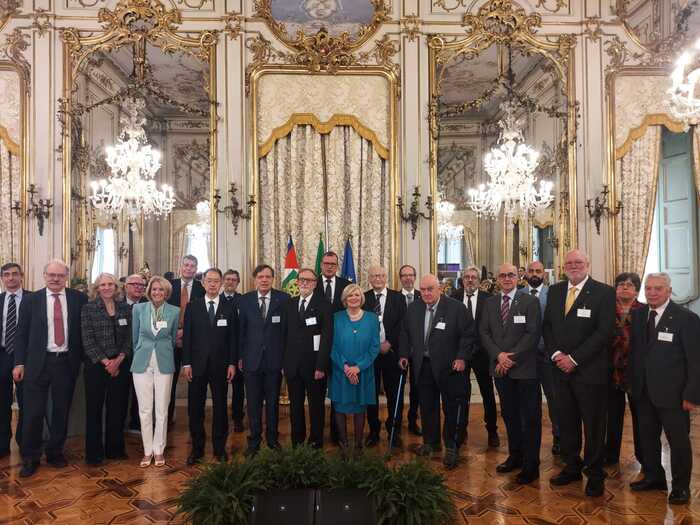Frédérique Vidal sees it as “qualitative rather than quantitative” proof.
Guest of the program "Sixty minutes business" on BFM Business on Monday, the Minister of Higher Education, Research and Innovation, wanted to recall the excellence of French scientific work.
But it was a bit quick.
Explanations.
What Frédérique Vidal said
“What is important is the qualitative more than the quantitative.
We haven't said it enough, but during this Covid crisis, among the ten most cited publications in the world, there were two French.
Obviously, publishing is important, but it is above all that the entire scientific community can rely on these publications that is important.
This is what advances science, ”she said on stage.
If the extract could have gone unnoticed, Frédérique Vidal wanted to recall this announcement on social networks.
"France is a great scientific nation: among the 10 most cited scientific publications in the world during this crisis, 2 were French," she then proudly tweeted to promote the government's stimulus plan.
What studies is she talking about?
Monday evening, many first believed that she mentioned in particular a study by Philippe Gautret, supervised by Didier Raoult, published in March 2020, on the use of chloroquine.
Work often undermined by the scientific community.
"It has certainly been cited 2,447 times ... But it is unanimous against it", then summarized an epidemiologist responding to the Minister.
Faced with many hostile reactions, Frédérique Vidal had to publish a new message this Tuesday morning to clarify her remarks.
“Precisions rather than background noise.
Here are the two publications I referred to.
Congratulations again to the teams of Jean-Laurent Casanova and Laurent Abel, ”she wrote this Tuesday morning, attaching a press release from the University of Paris.
This text welcomes the fact that “international research teams from the University of Paris, Inserm and AP-HP, within the Imagine Institute, and from Rockefeller University and the Howard Hughes Medical Institute to New York ”are among“ the 10 major breakthroughs of 2020 according to the prestigious journal Nature ”. Their work has indeed made it possible to understand why the individual response to infection with the coronavirus varies so much from one person to another. Work in which Jean-Laurent Casanova and Laurent Abel, the two French researchers, took part.
“It's as if we tweeted:
During the crisis, Renault and Peugeot in the top 10 manufacturers who sold the most cars in the world!
and then, as a source, we gave an article:
Autoplus magazine ranked Renault and Peugeot among the 10 best manufacturers in 2020,
”compares a French researcher.
Where does this “top 10” come from?
The classification made by the scientific journal Nature on which the minister based is entitled: "Viruses, microscopy and rapid radio bursts: 10 remarkable discoveries from 2020".
It was published on December 14, 2020. The minister never mentions it directly in her remarks but it can be found in the press release from the University of Paris that Frédérique Vidal shares.
In this classification, there are indeed two studies in which French researchers participated, "although some are associated with American organizations", plague French colleagues.
Except that the object of this classification is not concerned with the number of times these studies have been cited.
It is the result of a subjective choice by informed members of the scientific journal Nature.
“Words have a meaning.
She didn't say it was one of the 10 significant discoveries of 2020, she said it was among the 10 most cited publications.
Which is not the case ”, does not budge Eric Billy, researcher in immuno-oncology in Strasbourg.
Read alsoCovid-19: serious forms sometimes linked to our ... genes
What the minister also forgets to specify is that this Top 10 only includes work related to Covid-19.
Only the two studies in which the two French researchers participated deal with it.
The other eight studies point to advances in other areas such as the ozone layer, prehistory or HIV.
The magazine also specifies that the most read article on its website in 2020 is devoted to stress and hair bleaching ...
Why are these comments a problem?
Before the minister's details on these sources, her tweet had been greeted by hundreds of hostile messages from French scientists, outraged by what they thought was an enhancement of the disputed work of Philippe Gautret, supervised by Didier Raoult, at the about chloroquine.
But more broadly, the fact of presenting the number of citations around a study as a criterion of excellence has irritated the entire sector.
"The next step is what?
Compare the number of subscribers of scientists on social networks, even if their accounts only publish videos of kittens?
One asks.
Read alsoHydroxychloroquine: scientists criticize the methodology of the study in The Lancet
Many scientists evoke, the publication, in 2013, of the
San Francisco Declaration on Research Evaluation (called Dora).
This charter, signed by a large number of scientific organizations around the world and therefore French, provides that one of the principles of researchers is not to assess the quality of work according to the number of citations or times in journals.
“Dora says what matters is that the work is designed to advance the schmilblick, the research and not the ego of the authors.
Excellence is not linked to the number of citations, ”summarizes epidemiologist Dominique Costagliola, very upbeat.
In summary
Frédérique Vidal welcomed the fact that French studies were among the “most cited in the world” during “this Covid crisis”.
It was in fact referring to a selection of 10 discoveries published at the end of 2020 by the journal Nature, which effectively highlighted French work.
But most of these discoveries did not relate to the Covid, and above all, it was a subjective selection, unrelated to the number of citations.
Even so, the researchers wish to remember that the number of times a scientific study is cited has no relation to the quality of the study.


/cloudfront-eu-central-1.images.arcpublishing.com/prisa/KLI3SGJIBFDKLPYTO3RST5FOYY.jpg)
/cloudfront-eu-central-1.images.arcpublishing.com/prisa/SA64QHEFJFGB3OONE7GHYBUNBU.jpg)





